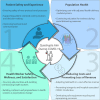Supporting the Quadruple Aim Using Simulation and Human Factors During COVID-19 Care
- PMID: 33830094
- PMCID: PMC8030878
- DOI: 10.1097/01.JMQ.0000735432.16289.d2
Supporting the Quadruple Aim Using Simulation and Human Factors During COVID-19 Care
Abstract
The health care sector has made radical changes to hospital operations and care delivery in response to the coronavirus disease (COVID-19) pandemic. This article examines pragmatic applications of simulation and human factors to support the Quadruple Aim of health system performance during the COVID-19 era. First, patient safety is enhanced through development and testing of new technologies, equipment, and protocols using laboratory-based and in situ simulation. Second, population health is strengthened through virtual platforms that deliver telehealth and remote simulation that ensure readiness for personnel to deploy to new clinical units. Third, prevention of lost revenue occurs through usability testing of equipment and computer-based simulations to predict system performance and resilience. Finally, simulation supports health worker wellness and satisfaction by identifying optimal work conditions that maximize productivity while protecting staff through preparedness training. Leveraging simulation and human factors will support a resilient and sustainable response to the pandemic in a transformed health care landscape.
Copyright © 2021 The Authors. Published by Wolters Kluwer Health, Inc. All rights reserved.
Conflict of interest statement
The authors have no conflicts of interest to disclose.
Figures


References
-
- Berwick DM, Nolan TW, Whittington J. The triple aim: care, health, and cost. Health Aff (Millwood). 2008; 27:759–769 - PubMed
-
- Hayden EM, Wong AH, Ackerman J, et al. Human Factors and Simulation in Emergency Medicine. Acad Emerg Med. 2018; 25:221–229 - PubMed
-
- Mercer SJ, Whittle C, Siggers B, et al. Simulation, human factors and defence anaesthesia. J R Army Med Corps. 2010; 1564 suppl 1365–369 - PubMed
Publication types
MeSH terms
Grants and funding
LinkOut - more resources
Full Text Sources
Other Literature Sources
Medical

